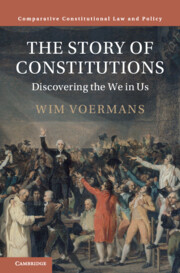Book contents
- The Story of Constitutions
- Comparative Constitutional Law and Policy
- The Story of Constitutions
- Copyright page
- Dedication
- Epigraph
- Contents
- Figures
- Prologue
- 1 Introduction
- Part I Constitutional Diffusion
- Part II The History of the Constitution
- Part III Concepts, Shapes and Types of Constitutions
- Part IV Effects
- Part V The Imagined Order of the Constitution
- References
- Name & Author Index
- Subject Index
1 - Introduction
The Century of Constitutions
Published online by Cambridge University Press: 19 October 2023
- The Story of Constitutions
- Comparative Constitutional Law and Policy
- The Story of Constitutions
- Copyright page
- Dedication
- Epigraph
- Contents
- Figures
- Prologue
- 1 Introduction
- Part I Constitutional Diffusion
- Part II The History of the Constitution
- Part III Concepts, Shapes and Types of Constitutions
- Part IV Effects
- Part V The Imagined Order of the Constitution
- References
- Name & Author Index
- Subject Index
Summary
189 out of 193 Nation States have a written constitution nowadays. Some 75% of them have only been put in place after 1975. Constitutions nowadays cover the global. How did this worldwide diffusion of constitutions come about? And why is it that this phenomenon is so understudied? Predominantly because traditional legal scholarship does not focus on numbers and externalities of their discipline. Law and constitutional law are imagined realities, produce of the imagination, but they are not studies this way - the bulk of legal scholarship even frowns upon such an approach. To understand why constitutions have conquered the world we have to look further afield. We need to journey through human evolution, human nature, the history of man and of thought, in search of answers for one of the most compelling and mobilising stories of our time. We need an empirical analysis of human imagination to understand.
Keywords
- Type
- Chapter
- Information
- The Story of ConstitutionsDiscovering the We in Us, pp. 4 - 30Publisher: Cambridge University PressPrint publication year: 2023

